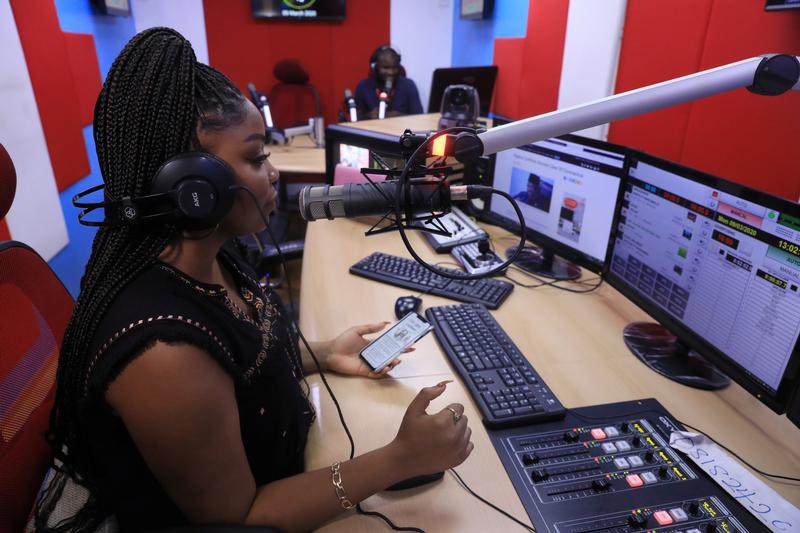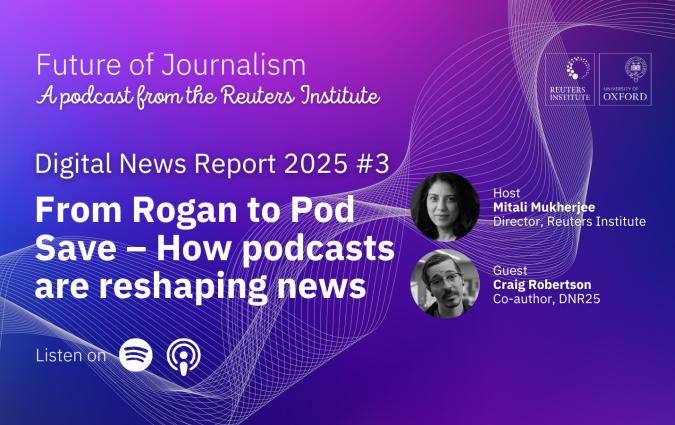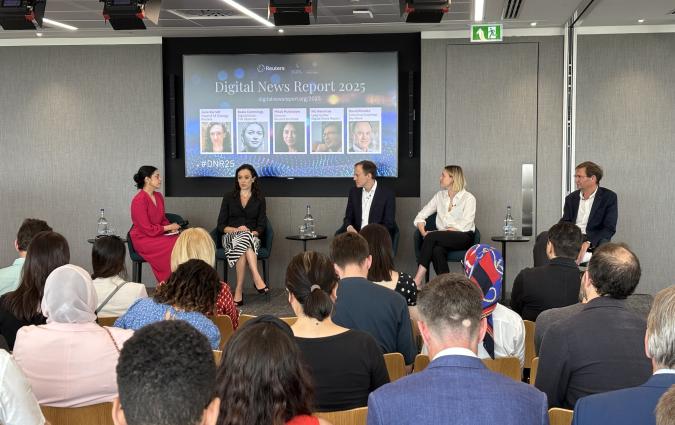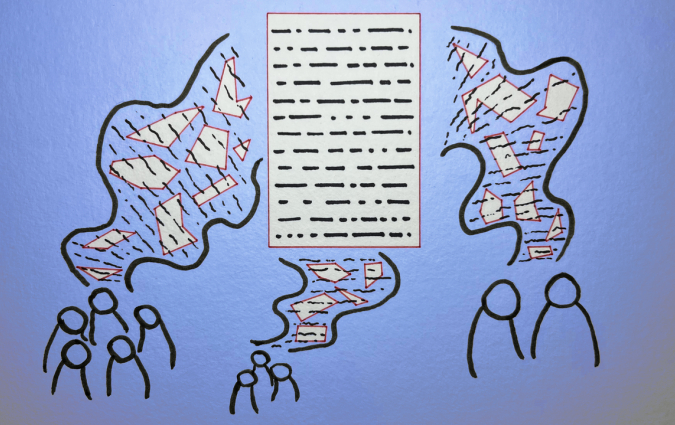This podcast startup offers free training to dozens of African investigative journalists

A radio presenter speaks about COVID-19 in Nigeria on 9 March 2020. REUTERS/Temilade Adelaja
African audiences are no strangers to podcasts, but this medium is not yet as popular as in Europe or the US. Around 25% of respondents to a survey conducted in Kenya in 2021 said they had listened to a podcast in the last month, but up to 60% didn’t know what a podcast was. Research by Africa Podfest recently pointed out that digital audio offered a great opportunity for marginalised communities to make their voices heard although uneven access to infrastructure and monetisation challenges make it difficult to grow.
With five years of experience in launching and growing audiences for African podcasts with podcast production company Volume, Paul McNally has launched Alibi Investigations, a new investigative unit and training centre focused on podcasting and audio journalism.
Alibi offers free mentoring, support and training to working African journalists. It will produce podcasts on its own and with these journalists, and offer paid training in investigative podcasting to newsrooms across the continent. McNally hopes that Alibi, launched in early 2022, will stimulate and support new African podcasting voices and audio journalism.
“There was a clear need for better audio investigative journalism on the continent and there’s a growing swell of people who want training in their newsrooms for better podcasts and audio but are not sure where to start,” he says.
How it started
The idea came from McNally’s experience with Volume, where he received an increasing number of story pitches or requests for training. The goal was to create a separate non-profit that could respond to this demand but make it free and more accessible to all types of newsrooms. “[If you charge], a smaller newsroom or freelancer won’t come to you, because they won’t have the money. And when a large newsroom comes, there’s a different set of expectations,” he says.
Alibi is moving to a for-profit model as McNally has found it will still be eligible for certain grants with this structure. But this access to training won’t change. Its first podcast series, Asylum, investigates the torture and atrocities faced by journalists in South Sudan. South Sudanese journalist Opoka p’Arop Otto, who now has asylum in The Netherlands and assists journalists back home, presents and co-produces the show. The podcast wants to “make clear” what resettlement and its aftermath looks like, says McNally: “People will be grateful and at the same lose their livelihood and their career. They may not know how to work or won’t be able to work as journalists in these new places. Some people choose not to take this route.”
Alibi is now developing more than 20 shows, from stories relating to kidnapping in Nigeria to insurgency in Mozambique and corruption in Zambia. McNally tries not to influence people in terms of what they pitch or be led by what is fundable. Another podcast sees a 50-year-old South African journalist returning to their old investigations, while production has started on The Outsiders, a three-part narrative series about how LGBTQ+ Nigerians gain access to healthcare despite discriminatory laws.
Training African podcasters
Asylum host Opoka participated in an Alibi’s programme providing training in narrative, writing, editing and podcast production skills as well as mentoring from McNally. A Google-group training community has now 130 members. Training through newsletters and Whatsapp voice notes are in development, all followed by check-ins with a real person.
Not all community members have reached the mentoring stage yet. “Once people feel comfortable with the basics we want them to go one-on-one,” says McNally. “When people have an idea they sometimes don’t want to share it with a group, but you need to get into the nitty-gritty of skills.”
These series will eventually feed into a weekly investigative show that is broadcast across Africa as a podcast and on radio stations, with an aim to produce 40 episodes a year. Participants in the training will not be required to produce for Alibi though. The aim is to “swell the podcasting space as much as possible” whether distributed by Alibi or elsewhere.
Alibi has received pitches and training inquiries from journalists who have worked in audio or radio already but haven’t done anything like this. “Those who have worked in radio come back with a format that’s like talk radio. Those who have only used their phone are coming back with formats more similar to ones done in Europe and the US,” McNally says.
How to distribute podcasts in Africa
Overall, Alibi wants to create more audio journalism in Africa. While radio (and talk radio in particular) are popular in countries like Kenya and South Africa, says McNally, there’s “very little journalism” on those stations. “We’re trying to convince the stations to play this more investigative journalism on the airwaves,” he says. “It’s a tough sell.”
To secure this airtime, Alibi is using a few different tactics. The business model for many South African community radio stations is to sell airtime, for example, which means Alibi is building pay-to-play into the budget of its podcasts so they will be translated into local languages and broadcast on these stations. “Part of me sees this as playing into the broken models, but it's also good content and it's money that the station needs,” he adds.
Distributing their podcasts via Alibi and third-party podcast platforms would give Alibi greater control, but it would risk missing a significant local audience. Listening to a podcast can be a complicated experience in countries where apps aren’t available or require expensive data and where multiple languages are spoken.
For Asylum, Alibi is trying to make in-roads with South Sudanese radio, which has gone into exile in its entirety. Working with local radio for distribution can expose this journalism to audiences unfamiliar with podcasting and do so in their own language “to meet people halfway”.
The more podcasts that Alibi helps bring from the initial pitch to full capacity, the more successful it will be. In its first year, a third of Alibi’s funding was from grants, while the remaining two-thirds came from delivering bespoke training tailored to specific newsrooms and clients. It recently received a grant from the Pulitzer Center and continues to produce materials and conduct training for clients including Deutsche Welle.
“We’re not trying to be podcast purists,” says McNally. “We’re taking a lot of good journalism that’s happening on the continent and combining it with audio, the most pervasive medium.”
In every email we send you'll find original reporting, evidence-based insights, online seminars and readings curated from 100s of sources - all in 5 minutes.
- Twice a week
- More than 20,000 people receive it
- Unsubscribe any time






